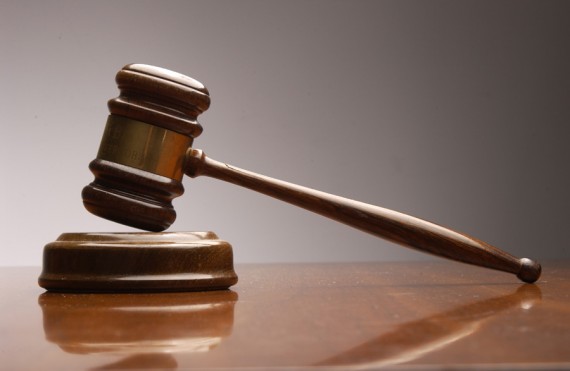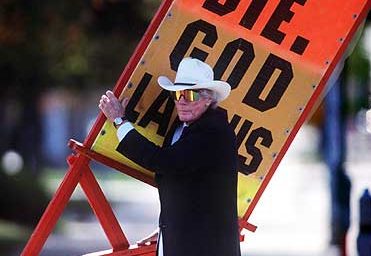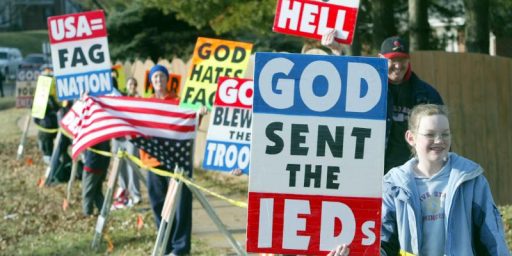The Supreme Court Takes Up The Westboro Baptist Church Protestors
The Supreme Court yesterday heard oral argument in a case where being on the right side means supporting some vile people, but that's what the First Amendment is all about.
Yesterday, the Supreme Court heard argument in Snyder v. Phelps, and took up the question of whether or not the infamous protesters from the Westboro Baptist Church can, or should, be held legally liable for speech that offends other people:
WASHINGTON — The Supreme Court heard arguments on Wednesday in a highly charged case involving protesters objecting to homosexuality who picketed a military funeral.
The father of a fallen Marine sued members of a Kansas church who had used his son’s funeral to spread their message that God is punishing the United States for its tolerance of homosexuality by killing its soldiers.
“We’re talking about a funeral,” Sean E. Summers, a lawyer for the father, Albert Snyder, told the justices. “Mr. Snyder simply wanted to bury his son in a private, dignified manner.”
The lawyer on the other side, Margie J. Phelps, said the First Amendment protected the protest, where seven pickets at some distance from the funeral carried signs with messages like “Thank God for dead soldiers” and “God hates you.”
Ms. Phelps is a daughter of the pastor of the church, Westboro Baptist Church of Topeka, Kan. Her argument alternated between smooth exposition of First Amendment doctrine and support for the church’s message.
“Nation, hear this little church,” she said. “If you want them to stop dying, stop sinning.”
Justice Ruth Bader Ginsburg noted that state and local governments had enacted laws creating content-neutral buffer zones around funerals. She suggested that those sorts of laws were a better response to protests than allowing private-injury suits.
Justice Samuel A. Alito Jr. said the existence of a buffer zone imposed by law did not necessarily pre-empt other remedies.
(…)
Mr. Summers said that some of the signs made the fallen Marine, Lance Cpl. Matthew A. Snyder, and his family their targets, including one that said, “You’re going to hell.”
Justice Ginsburg noted that the church used those signs at many protests. “It sounds like the ‘you’ was the whole society, the whole rotten society in their view,” she said.
Mr. Summers then made a concession that some justices seemed to view as problematic, saying that his client would have had no case if the signs were purely political protests against, say, the war in Iraq.
“So the intrusion upon the privacy of the funeral is out of the case,” Justice Antonin Scalia mused.
Mr. Summers tried to distinguish his case from the leading decision in this area, Hustler Magazine v. Falwell in 1988, which overturned a jury award in favor of the Rev. Jerry Falwell for intentional infliction of emotional distress. That case involved a public figure, Mr. Summers said, while Mr. Snyder was a private one.
Justice Elena Kagan responded with a quotation from the Falwell decision.
” ‘Outrageousness’ in the area of political and social discourse has an inherent subjectiveness about it which would allow a jury to impose liability on the basis of the jurors’ tastes or views, or perhaps on the basis of their dislike of a particular expression,” she said, quoting Chief Justice William H. Rehnquist’s majority opinion.
“How is that sentence less implicated,” Justice Kagan asked, “in a case about a private figure than a case about a public figure?”
Mr. Summers said private grief raised different issues.
Writing about the oral argument, Dahlia Lithwick notes that the Justices seemed to be struggling not so much with the applicable law, but with the fact of the case itself:
The headline writers are going to say that the justices “struggled” with this case. That may be so, but what they struggled with has very little to do with the law, which rather clearly protects even the most offensive speech about public matters such as war and morality. They are struggling here with the facts, which they hate. Which we all hate. But looking at the parties through hate-colored glasses has never been the best way to think about the First Amendment. In fact, as I understand it, that’s why we needed a First Amendment in the first place.
And Ilya Somin notes that there are many things that this case is not about:
A private cemetery can and should remove unwanted visitors for trespassing — but the Phelpses didn’t enter the cemetery. A town can pass ordinances restricting the time, place, and manner of protests — but the Phelpses stayed within all applicable regulations and followed police instructions. Violent or aggressive protestors can be both prosecuted and sued for assault, harassment, and the like — but the Phelpses’ protests are neither loud nor involve “getting up in the grill” of people, as their lawyer (and church member) put it during oral argument. In short, there’s very little to this case and the Phelpses’ actions, ugly and objectionable as they are, are as constitutionally protected as a neo-Nazi parade. If people don’t like that, they can change state laws to put certain further restrictions on protests near funerals or other sensitive areas — or federal laws in the case of military cemeteries—but they shouldn’t be able to sue simply for being offended
And that, ultimately, is what this really comes down to. Like the protests over cartoon images of Muhammed, or the burning of a Koran, or the construction of an Islamic community center two blocks from the site of the 9/11 attacks, there is no such thing as a Constitutional right to not be offended. Just as the National Socialist Party of America had a right to march through the streets of a predominantly Jewish Chicago suburb, the Westboro Baptist Church has the right to protest outside funerals. Freedom of speech means that, sometimes, we will hear some truly offensive things. When government starts egulating speech based on the fact that it may offend, though, it diminishes freedom for everyone.
In the end, I expect we’ll see the Supreme Court rule in favor of the Phelps parties, and as much as all of us will be offended by it, it will be the right decision.






Those people suck, I am not sure what I would do if I seen them holding their true and actual hate signs while they stomp on our flag, and deny the Sacred ceremony of our fallen country men..
Scumbags hypocrite false prophets!!!!!
In the end, I expect we’ll see the Supreme Court rule in favor of the Phelps parties, and as much as all of us will be offended by it, it will be the right decision.
Agreed.
I do wonder why, if there is a god, he hasn’t rid the world of these people. One would think their behavior would be highly irritating.
‘In the end, I expect we’ll see the Supreme Court rule in favor of the Phelps parties…”
I wouldn’t be so sure. From the reporting that I have seen/heard about the oral arguments, it seems like Ginsburg was the only justice that was holding to a strict FIrst Amendment line, and that most of the others seemed to be looking for ways to let the tort case proceed without muddying the free speech standards.
“When government starts regulating speech based on the fact that it may offend, though, it diminishes freedom for everyone.”
But this is not a case of the government vs. the Phelps – this is not a case of regulating their speech. It is a private, civil tort case.
From the reporting that I have seen/heard about the oral arguments, it seems like Ginsburg was the only justice that was holding to a strict FIrst Amendment line, and that most of the others seemed to be looking for ways to let the tort case proceed without muddying the free speech standards.
The questions justices ask are not always good predictors of the decision.
If I were the legislature, I’d pass a law that indicated it was justified defense to punch a funeral protestor in the face.
***“When government starts regulating speech based on the fact that it may offend, though, it diminishes freedom for everyone.”***
I’m not much for hate crime laws because of the way that they are agenda driven and will surely become what they are said to be against, but this makes me wish for something of the type.
Offend? These are, from their own words, signs, beliefs, and actions the kind of Christians(I don’t believe they are Christians) that any of us who dare to point out for the sake of those who we feel are in need of education about Gods word on sin are accused of being. CAN YOU TELL THE DIFFERANCE NOW??????
One thing that burns me about this case is that the Phelps have been this for decades. When they were picketing the funerals of homosexuals none of the people crying bloody murder now could have cared less.